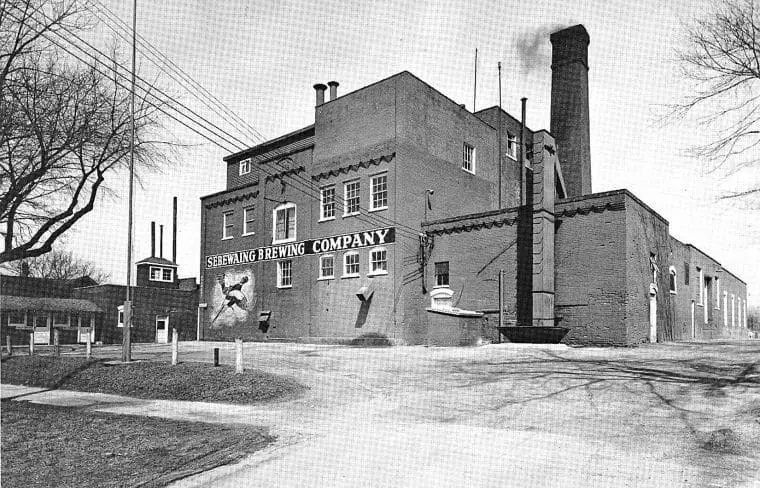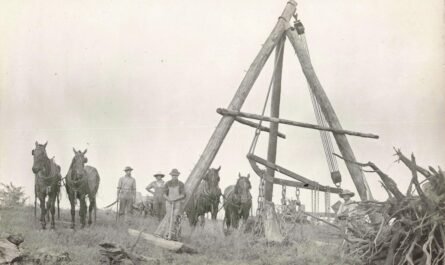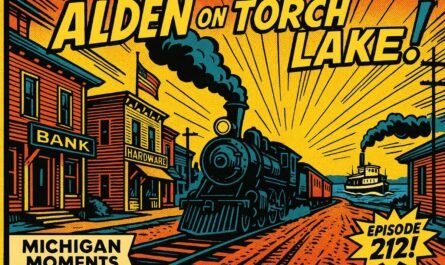Sebewaing Brewing Company was a local Michigan beer company that served the Michigan Thumb market. Six-packs of long necks cost a little less than a dollar plus a deposit. True to its German roots, the brewery offered all Malt Pilsner, Lagers, and Bock-style beers.
Table of Contents
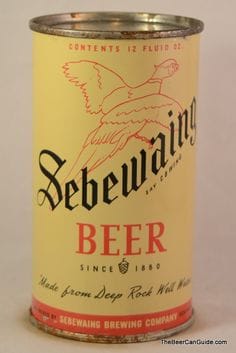
1939 Advertisement for Sebewaing Brewing Co.

Each week the Sebewaing Brewing Company would post a small column with a factoid ad in the Huron Times. This would entice readers to look for proof of the statement in next week’s paper.
Three Lion Cubs Turn to Company Mascots
After an opportunity presented itself, a one-of-a-kind marketing campaign was born. Three baby lion cubs were brought to Sebewaing by a circus owner who intended to sell them. Dr. J.E. Wurm, the brewer’s president, purchased them. They drove around the area in an old trailer that had been converted into a traveling cage.
An article in the New York times printed on July 28, 1940: “With a steel-barred cage containing four African lions in its rear compartment, a trailer of the Sebewaing Brewing Company of Michigan advertises its trademark. “Kings of Beer and Ale.”
Many people wanted to see lions because they are not common in Michigan. Once the lions were acquired, a lion’s head was placed in the middle of the Old Style label. However, by 1948, the difficulties of having lions in town, as well as the cost of feeding them, had become more than the brewery’s management could bear.

What happened to the lions after the company decided not to continue keeping them is not really know. One story of local lore tells that they were sold to zoos. One female lioness named Queenie was shot and stuffed. Sadly the most common theory was that all the lions were euthanized with a .22 rifle
Sebewaing Brewing Expands for A Wider Market
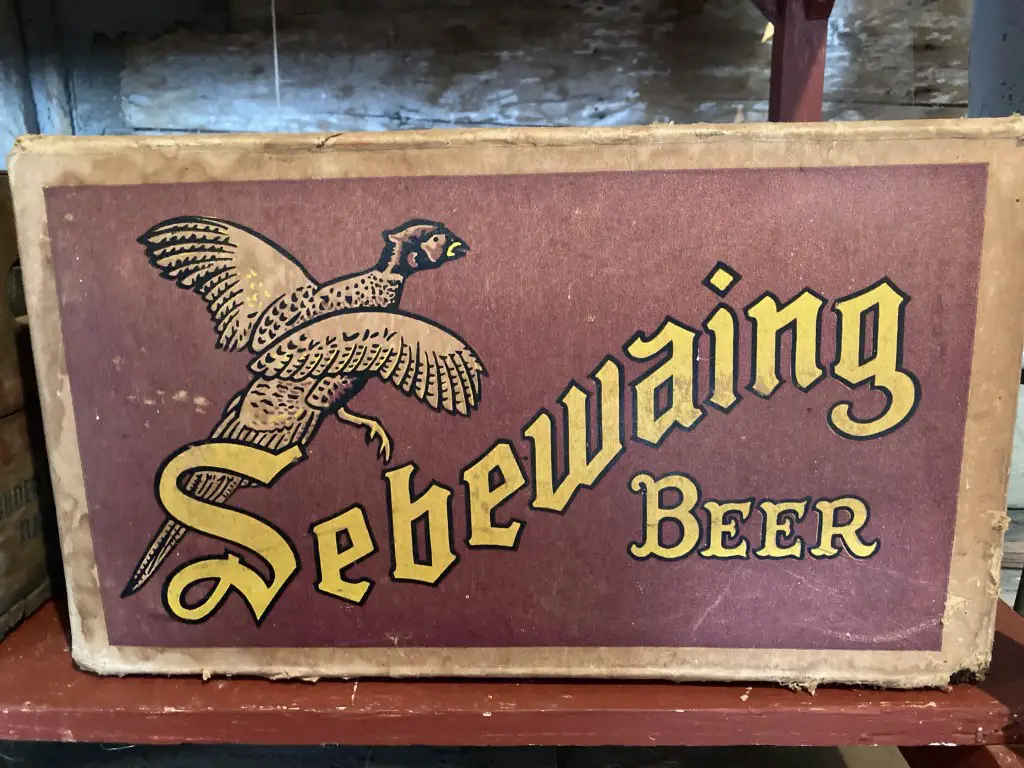
During its peak in the late 1950s and early 1960s, the brewery employed about 30 people. Then, in 1962, a group of Detroit businessmen bought Sebewaing Brewing and changed the name to Michigan Brewing Company. In 1965, faced with declining revenue and increases in taxes, they wanted to sell the company to a Toledo brewer, Buckey Brewing. In addition, the group wanted to expand sales heavily throughout the region and state to take the company’s brews national.
A brutal proxy battle eventually wound up putting the brewery back in the hands of local control, but the damage had been done. Sales declined, and the reputation of the brewery suffered, and it closed in 1966.
Sebewaing Beer Collectables

The last day of the Sebewaing Mi Brewing Company was June 4, 1966. Today the cans are collectible, case boxes, and other memorabilia and can be found online and in antique shops throughout Michigan.
Sebewaing Brewery Beers Make a Brief Comeback
The Michigan Brewing Company produced a commemorative beer styled after the Sebewaing Brewing Company’s signature beer for a short period. This beer was commissioned for the town of Sebewaing’s 150th-anniversary celebration in 2003. The commemorative six-packs featured labels of the “Sebewaing Flying Pheasant,” “Golden Pheasant,” and the “Sport” label, showing a flying goose, duck, and pheasant.
The Golden Pheasant beer made another appearance in 2014 during the Sebewaing Sugar Festival. Again, the Tri-City Brewing Company made it.
The Legacy and Revival of Sebewaing Brewing
Sebewaing Brewing Company, once a significant part of Michigan’s beer history, has left a lasting legacy in the Thumb region. It gained prominence by producing popular brews like Sebewaing Select Beer and Golden Pheasant Beer, making it a staple in local taverns and homes.
The brewery underwent several transformations, including a brief closure during Prohibition and a revival in the 1930s. It played a crucial role in the local economy, providing jobs and fostering a sense of community. Sebewaing Brewing Company continued to produce beer until it closed its doors in 1966.
In recent years, there has been a renewed interest in the history of Sebewaing Brewing. Local enthusiasts and historians have sought to preserve its memory through various initiatives. Efforts include collecting memorabilia, sharing stories, and even homebrewing some of the old recipes. The resurgence of craft beer culture has inspired many to look back at the roots of brewing in Michigan, and Sebewaing Brewing Company’s story remains a captivating chapter in that history.
What was Sebewaing Brewing Company’s most popular beer?
Sebewaing Brewing Company’s most popular beers included Sebewaing Select Beer and Golden Pheasant Beer. These brews were well-loved in the region and contributed to the brewery’s success during its operational years.
How is the legacy of Sebewaing Brewing Company being preserved today?
The legacy of Sebewaing Brewing Company is being preserved through local historical efforts, including collecting memorabilia, sharing stories, and homebrewing old recipes. There is a growing interest in the brewery’s history, especially with the resurgence of craft beer culture. Enthusiasts and historians continue to honor the brewery’s impact on the community and Michigan’s brewing history.
Related Reading for Michigan Beer Companies
- Sebewaing Brewing Fan Site – The definitive website for all things about Sebewaing Brewing Company.
- Jenny, Quanicassee’s Beer Drinking Bear – Saloon owner Frank Vanderbilt started collecting wild animals for a roadside zoo near Quanicassee. His early acquisition was a female black bear. The cub was supposedly orphaned after a fire in the Clare area. How Frank acquired the young cub is truly unknown but it became part of the saloons attraction.
- Local Brewing is Sustainable and Tasty – With energy resources becoming the global concern that it is, will beer disappear? However, it will be more likely that the beer I drink may be locally brewed in order to be sustainable as opposed to a Molson, Coors, or PBR.
- The End of the 3,000 Mile Beer? – I give you this scenario for globalized worlds that need to become local. I pose the need for localization aligning with the effect on beer because what would the world be without beer?
- Sebewaing History – A Busy Harbor – The lumbering era in Michigan’s Upper Thumb from 1860-1880 resulted in booming towns all along the shoreline. Sebewaing was no exception.
- Sebewaing Railway Depot – Understated History – Neglected, with broken windows, faded peeling paint, and vines almost covering one end it seems like a sad fate is ahead for this small historical gem. Amazingly it’s still in use by the Huron and Eastern Railway.

